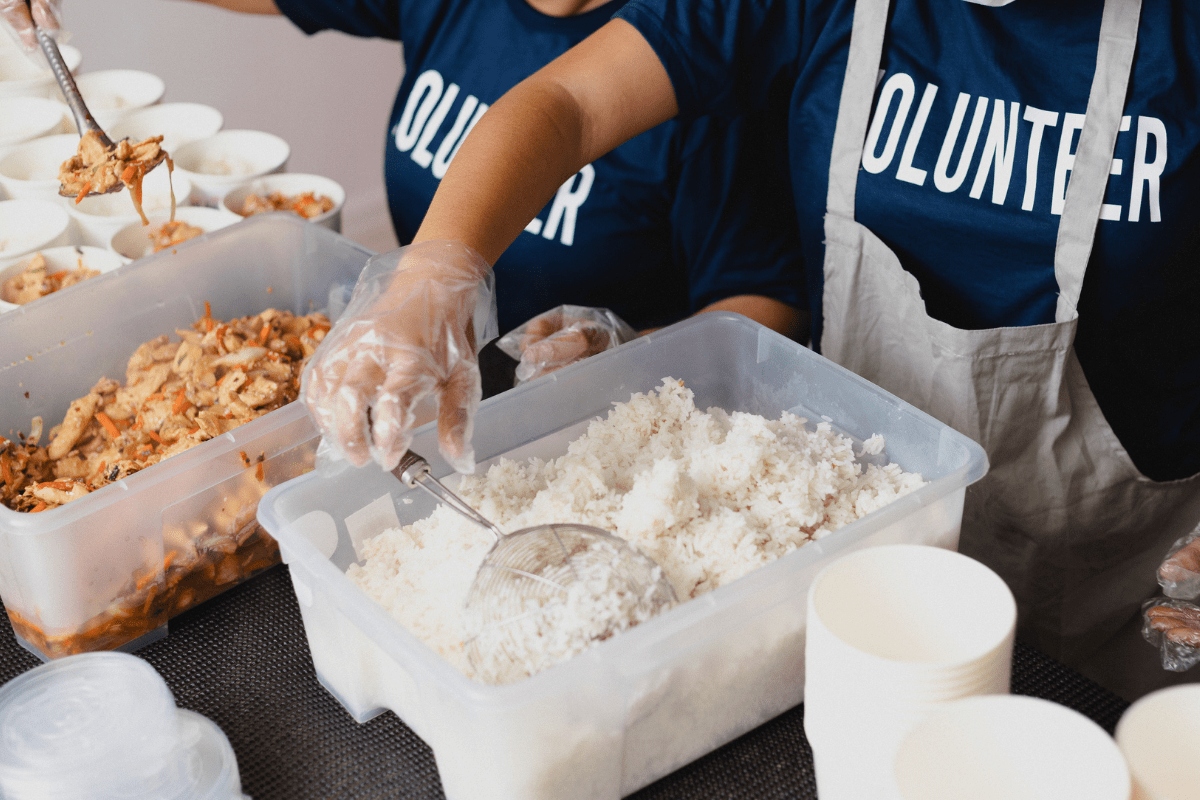Vancouver, Washington has more volunteer opportunities than you can shake a stick at. Seriously, with over 3,400 nonprofits in Clark County alone, you're more likely to run out of free time than options. Whether you want to walk shelter dogs, serve meals to neighbors in need, or plant trees until your back hurts (in a good way), this guide will help you find exactly where your time and energy can make the biggest impact. Let's dive into the surprisingly vibrant world of Vancouver volunteering, where making friends and changing lives go hand in hand.
Start here: The easiest ways to jump in
Before we get into the weeds of specific organizations, let's talk about the three fastest ways to start volunteering without overthinking it. The beauty of Vancouver's volunteer scene is that multiple organizations have done the hard work of matching volunteers with opportunities, so you don't have to cold-call every nonprofit in town.
Hands On Greater Portland serves the Vancouver metro area with what they call "done-in-a-day" projects… perfect if you want to help but aren't ready to commit to weekly shifts. Think community garden cleanups, food bank sorting marathons, or painting projects that wrap up before you start questioning your life choices. These folks understand that modern life is chaotic, and they've built their entire program around accommodating busy schedules.
For a more comprehensive search, VolunteerMatch.org maintains searchable listings specific to Clark County. You can filter by cause, time commitment, and even whether you want to work with kids, adults, or prefer the company of animals who won't judge your small talk skills. JustServe.org offers another solid option with a dedicated Vancouver page, though their interface feels a bit more like it was designed by well-meaning church volunteers rather than tech professionals.
Your three-step action plan
Here's the foolproof method for getting started:
- Pick your cause – What makes you angry or hopeful?
- Be honest about time – Two hours monthly beats zero
- Make contact – Actually send that email or make the call
- Show up – The hardest and most important step
The biggest mistake people make is overthinking the commitment level. Most organizations would rather have you volunteer sporadically than not at all, despite what their websites might suggest about "reliable volunteers."
The heavy hitters: Organizations that'll keep you busy
Some Vancouver nonprofits have volunteer programs so robust they practically run themselves. These are your best bets if you want to plug into something established with clear systems and plenty of support.
Share Vancouver: The community safety net headquarters
Share Vancouver operates from 1115 W 13th Street and manages to coordinate 2,600 volunteers who contribute 26,650 hours annually, which translates to roughly $929,000 in donated time when you calculate it at Washington's volunteer value of $34.87 per hour. But let's be honest, nobody volunteers for the theoretical economic impact. They volunteer because Share Vancouver makes it incredibly easy to help your neighbors.
Their volunteer coordinator Molly Evjen (mevjen@sharevancouver.org, 360-952-8228) runs a surprisingly sophisticated online system where you can claim shifts that match your schedule. We're talking hot meal prep, packing weekend food bags for students, organizing warehouse donations, and coordinating special holiday distributions that would make Santa's workshop jealous.
The organization explicitly welcomes volunteers 16 and older to work independently, though younger kids can participate with adult supervision. More importantly, they've stated clearly: "We have volunteer opportunities for everyone. Please let a Share staff member know if you need special accommodations." That's not corporate speak… they genuinely mean it.
Clark County Food Bank: Where 8,200 volunteers make magic happen
The numbers here are staggering: 8,200 volunteers contributing 66,000 service hours annually, representing about $2.3 million in contributed labor. But again, the real story isn't the statistics. It's that Clark County Food Bank has figured out how to make volunteering feel both meaningful and manageable.
Their Heritage Farm hosts family-friendly work parties Monday, Wednesday, and Saturday mornings from May through October. Picture this: you and your kids planting vegetables that will eventually feed other families in your community. It's volunteer work that actually makes sense to explain to a eight-year-old, which is rarer than you'd think.
City of Vancouver: Government that actually wants your help
Contact the city's volunteer coordinator at cityvolunteer@cityofvancouver.us or 360-487-8344, and you'll discover that Vancouver's municipal government has embraced volunteers in ways that would make other cities jealous. Their tree planting events run Saturday mornings from 8:45am to noon. Perfect timing for people who want to do good and still have afternoon weekend time.
The Urban Forestry program partners with Friends of Trees to expand Vancouver's urban canopy, while their Naturespaces program focuses on native habitat enhancement. They provide all the tools, training, and supplies; you just need closed-toe shoes and the willingness to get a little dirty. Their Adopt-A-Park program lets groups maintain specific parks through monthly work parties from April through September, which sounds like a great way to become locally famous as "those people who actually pick up trash."
Healthcare volunteering: More than just reading magazines to patients
Vancouver's medical centers have developed volunteer programs that go way beyond the stereotypical candy striper roles, though if that's your thing, they've got those too.
PeaceHealth Southwest Medical Center: The volunteer powerhouse
With 350 active volunteers contributing 70,000 hours annually, PeaceHealth runs what might be the most professional volunteer program in Southwest Washington. They've got monthly orientations for people committing to four-hour weekly shifts, which sounds intense but actually works well for retirees or anyone who wants structure in their volunteer life.
The opportunities range from guest services at information desks to clinical support in surgery waiting areas, plus specialty programs at the Kearney Breast Care Center. Their Community Quilting Program has volunteers creating comfort items for patients, which seems like exactly the kind of thing that makes being in the hospital slightly less terrible.
Fair warning: they require COVID-19 and flu vaccinations, background checks, and a 50-hour minimum commitment. This isn't casual volunteering. It's for people who want to make a serious contribution to healthcare. Contact them at volunteer@peacehealth.org.
Legacy Salmon Creek Medical Center: The friendlier option
Legacy Salmon Creek offers similarly diverse opportunities but with a more relaxed vibe. Their Green Gables Guest House hosting program, beverage cart service, and pediatric visitation opportunities come with perks like meal passes, fitness center access, and educational workshops. They accept high school students 14 and older, making this a good option for families who want to volunteer together.
The program reopens in December 2025 after their summer hiatus, so contact volunteer manager Laura Walsh at Lwalsh@lhs.org or 360-487-1040 to get on their list.
Animal welfare: Because dogs are better than people (sometimes)
Let's be honest… sometimes you want to volunteer but prefer the company of creatures who won't try to make small talk about the weather.
Humane Society for Southwest Washington: Serious animal commitment
The Humane Society cares for 8,000 animals annually at their 1100 NE 192nd Avenue facility, and they need volunteers who understand that animals require consistency. Dog walkers and cat socializers must commit to weekly two-hour shifts for six months minimum. This isn't negotiable because animals bond with regular volunteers.
Their ReTails Thrift Store offers more flexible biweekly shifts in customer service and merchandising for people who want to support animal welfare without the emotional intensity of working directly with shelter animals. Teen volunteers 16 and older can participate independently, and they use a BetterImpact platform for registration that actually works better than most nonprofit volunteer systems.
Contact volunteers@southwesthumane.org, but be prepared to take this commitment seriously. These animals have already been through enough disruption in their lives.
Environmental programs: Getting dirty for a good cause
Vancouver takes its environmental programs seriously, partly because we live in one of the most beautiful places on earth and partly because we have the volunteer infrastructure to actually make a difference.
City forestry programs: Trees everywhere
The City of Vancouver's partnership with Friends of Trees has created a tree-planting machine that operates with impressive efficiency. Saturday morning events from 8:45am to noon give weekend warriors the chance to expand Vancouver's urban canopy while learning about regional ecology. The Urban Forestry program provides everything except your enthusiasm and weather-appropriate clothing.
Clark County Public Works: The bigger picture
Clark County Public Works (contact Cindy Gonzalez at cindy.gonzalez@clark.wa.gov or 564-397-1679) coordinates Adopt-A-Road programs where groups conduct three annual litter cleanups along designated road segments. They also offer independent assignments for self-directed people who want to tackle invasive species removal or conduct wildlife surveys without committee meetings.
The county provides all supplies and waste disposal, which means you can focus on the actual work instead of logistics. It's volunteer work for people who prefer action over endless planning sessions.
Government and community services: Civic engagement that actually works
Vancouver's government has figured out how to integrate volunteers throughout city operations in ways that feel meaningful rather than like make-work projects.
Police and fire programs: Public safety support
The Vancouver Police Department's Volunteers in Police Service program handles administrative tasks and specialized projects that free up sworn officers for actual police work. Their Paws on Patrol program engages dog walkers as neighborhood observers. No pet required, though it helps if you enjoy walking.
Fire Corps volunteers provide non-emergency support through the national Citizen Corps partnership. All public safety positions require background checks, which shouldn't surprise anyone who's thought about this for more than thirty seconds.
Library system: Books and so much more
Fort Vancouver Regional Library operates 13 branches that rely on volunteers for everything from shelving books to assisting with computer classes. Their Teen Council meets monthly on first Mondays, providing leadership development for ages 13-18 that actually prepares young people for adult civic engagement.
Apply online at fvrl.org/volunteer or contact volunteer@fvrl.org and 360-906-5075. Criminal background checks apply to volunteers 18 and older, which makes sense when you're working around children and vulnerable populations.
Faith-based and community support
Vancouver's faith communities have created volunteer opportunities that welcome people regardless of religious affiliation, focusing on service rather than conversion.
Interfaith cooperation: Serving everyone
Interfaith Volunteer Caregivers matches volunteers with seniors needing transportation, grocery shopping, or friendly visits. This program exemplifies different faith communities working together to address isolation among elderly residents… a problem that affects everyone regardless of religious background.
Practical support organizations
FISH Vancouver (906 Harney Street, 360-695-4903) operates an emergency food pantry serving 1,500 families monthly with help from 100 volunteers. They're open Monday through Friday 10am-2pm plus first Saturdays 10am-noon for food sorting, distribution, and administrative support. St. Vincent de Paul Vancouver provides similar services at 2456 NE Stapleton Road with food pantries and clothing distribution Monday, Tuesday, Thursday, and Friday 9am-1pm.
Age-specific opportunities: Volunteering for every life stage
Vancouver's volunteer programs have evolved to accommodate different age groups and family situations, recognizing that meaningful service looks different at various life stages.
Youth and family programs
Share Vancouver accepts volunteers as young as eight for their Backpack Program when accompanied by adults, while independent volunteering begins at 16. The City of Vancouver allows 14-year-olds to participate with signed consent forms, creating pathways for young people to develop civic engagement habits early.
Great Life Mentoring matches adult volunteers with children ages 9-16 who have experienced trauma, creating stable relationships that can literally transform young lives. This isn't casual volunteering. It requires training and emotional maturity, but the impact justifies the commitment.
Senior volunteer opportunities
While Vancouver lost its formal RSVP program in 2020, senior volunteers find meaningful engagement through Interfaith Volunteer Caregivers helping other seniors and Clark County Parks programs offering outdoor activities that accommodate various fitness levels. The wisdom and life experience that older volunteers bring to programs often proves invaluable to both organizations and younger volunteers.
Making it work: Overcoming common barriers
Every potential volunteer faces obstacles, but Vancouver's volunteer community has developed practical solutions for the most common challenges.
Transportation and accessibility
Volunteers in Motion provides rides for seniors and disabled residents, removing transportation barriers that prevent people from both volunteering and accessing services. One participant noted they had canceled nine medical appointments before discovering the service, illustrating how volunteer drivers restore independence while creating meaningful connections.
Many organizations now offer virtual volunteering including data entry, social media management, and remote mentoring, eliminating commute requirements entirely. This development, accelerated by the pandemic, has made volunteering accessible to people with mobility limitations or demanding work schedules.
Flexible scheduling solutions
Share Vancouver explicitly advertises shifts "after school or work hours or on the weekends," while multiple organizations use online scheduling platforms that allow volunteers to claim shifts matching their availability. Micro-volunteering through one-time events requires no ongoing commitment, perfect for people testing the waters or dealing with unpredictable schedules.
The most successful volunteers are honest about their limitations from the beginning rather than over-committing and burning out after six weeks.
The real impact: Why this matters
Vancouver's volunteer infrastructure creates measurable community impact while providing personal fulfillment that many people desperately need.
Economic impact that's actually meaningful
With Washington volunteer hours valued at $34.87 each, Clark County's volunteer efforts represent millions of dollars in contributed labor annually. Share Vancouver's 26,650 volunteer hours equal $929,000 in donated time, while Clark County Food Bank's 66,000 hours represent $2.3 million in contributed labor.
But the real story isn't economic… it's personal. FISH volunteers describe their organization going "over and above to help neighbors in need," while recovery advocates find purpose "supporting and mentoring people fighting the lifestyle of drugs and incarceration." These testimonials reveal volunteering's dual benefit: helping others while discovering personal meaning.
Recognition and community building
Vancouver celebrates volunteers through programs like the Volunteer Grove Awards, which honor outstanding service by planting trees in volunteers' names. Recent honorees include Ken, who logged over 100 hours with Fire Corps, and Steve, who led monthly Adopt-A-Park work parties accumulating 180 service hours. These tangible monuments create lasting tributes to community service while inspiring others.
Your next steps: Actually getting started
The best volunteer opportunity is the one you'll actually do consistently, not the one that sounds most impressive on paper. Start with organizations that match your schedule and interests, then expand as you discover what type of service energizes rather than drains you.
Key contacts for immediate action include Share Vancouver (mevjen@sharevancouver.org, 360-952-8228) for diverse scheduling options, City of Vancouver (cityvolunteer@cityofvancouver.us, 360-487-8344) for environmental and event opportunities, and the Humane Society (volunteers@southwesthumane.org) for animal welfare work.
Vancouver's volunteer community stands ready to welcome your contribution, whatever form it takes. With 3,493 nonprofits operating across Clark County, you're guaranteed to find opportunities matching your schedule, skills, and passion. The hardest part is making that first contact… everything else flows from there.





